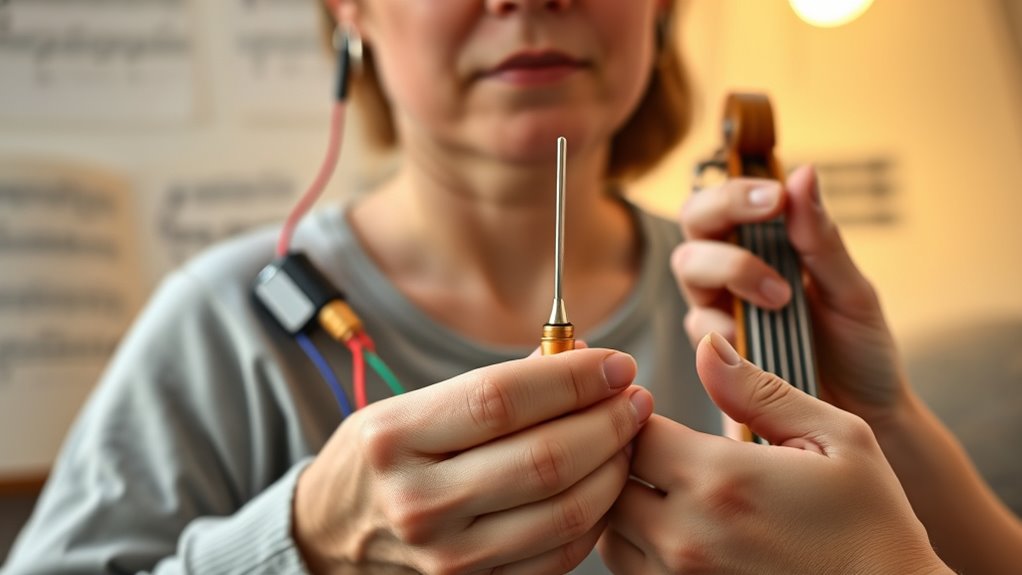Music therapy for cochlear implant users helps you reconnect with sounds and improves your auditory experience by personalizing activities based on your musical preferences. It uses engaging musical exercises that evoke emotions like joy or calmness, making listening more meaningful and enjoyable. This approach stimulates your brain’s sound processing and builds confidence over time. If you continue exploring, you’ll discover how customized music therapy can transform your listening journey and overall well-being.
Key Takeaways
- Music therapy helps cochlear implant users re-acclimate to sounds by engaging with personalized music experiences.
- It uses familiar genres and songs to motivate and make auditory training more meaningful.
- Therapy evokes emotional responses, strengthening neural pathways for sound and speech recognition.
- Diverse music genres stimulate different neural pathways, enhancing auditory processing and enjoyment.
- Overall, music therapy improves sound recognition, boosts confidence, and promotes emotional well-being.

Have you ever wondered how music therapy can enhance the experience of cochlear implant users? When you’re adjusting to a cochlear implant, the world of sound can feel overwhelming or unfamiliar. Music therapy offers a tailored approach to help you reconnect with the sounds you love, making your auditory experience more meaningful. One of the key aspects of this process involves exploring your musical preferences. By focusing on the genres, songs, or styles you enjoy most, therapists can design sessions that resonate with your personal taste. This personalized approach keeps you engaged and motivated, encouraging you to listen more actively and with greater enthusiasm. As you immerse yourself in music that you already cherish, your brain begins to strengthen its ability to interpret complex sound patterns, which can improve overall auditory perception over time.
The emotional impact of music plays a significant role in this therapeutic journey. Music naturally evokes feelings—joy, nostalgia, excitement, or even calmness—that help you connect on a deeper level. When you listen to familiar tunes or melodies that hold special meaning, your emotional response can amplify the benefits of therapy. This emotional engagement encourages your brain to form new neural pathways, making it easier to distinguish different sounds and speech cues. As a result, your confidence grows, and listening becomes a more positive, rewarding experience. Music therapy taps into this emotional connection, turning what might seem like a simple listening activity into an empowering tool for communication and emotional well-being.
Additionally, understanding that diverse genres can stimulate different neural pathways helps therapists tailor activities to maximize auditory and emotional engagement. Furthermore, your musical preferences and emotional responses guide the therapist in selecting appropriate exercises and activities. If you find particular genres more uplifting or relaxing, the therapist can incorporate those into your sessions, creating a comfortable environment conducive to learning. This personalized strategy helps you stay motivated and reduces frustration often associated with adjusting to new auditory inputs. Over time, you’ll notice improvements not just in recognizing sounds but also in enjoying music again, which is essential for maintaining a rich social and emotional life. The emotional impact of music, combined with your personal preferences, forms the foundation of an effective, engaging therapy that supports your journey toward a fuller, more connected auditory experience with your cochlear implant.
Frequently Asked Questions
Can Music Therapy Improve Speech Recognition in Cochlear Implant Users?
Music therapy can indeed improve speech recognition in cochlear implant users. By enhancing music perception, you become more attuned to subtle sound cues, which helps distinguish speech sounds more accurately. Additionally, engaging in music therapy often boosts your emotional response, making listening more enjoyable and encouraging consistent practice. This combined effect can lead to better speech understanding, enriching your overall communication skills and quality of life.
How Long Does It Typically Take to See Benefits From Music Therapy?
They say patience is a virtue, and it’s true here. You might start noticing benefits from music therapy within a few months, but it varies depending on your therapy duration and individual progress. Timing expectations differ; some see improvements in as little as 3-6 months, while others may need longer. Stay consistent and committed, and remember that steady progress often leads to the best long-term results.
Are There Specific Types of Music Best Suited for Therapy?
When choosing music for therapy, you should consider your genre preferences and musical complexity. Opt for familiar tunes that you enjoy, as they engage your auditory system more effectively. Simpler melodies with clear rhythms can be easier to process and help improve your listening skills. Avoid overly complex or unfamiliar pieces initially, and gradually explore more challenging music as your hearing improves. This personalized approach maximizes therapy benefits.
Is Music Therapy Suitable for All Ages With Cochlear Implants?
You might wonder if music therapy suits all ages with cochlear implants. Age considerations and developmental stages play a role, as younger children often adapt more quickly, benefiting from early intervention. Older individuals can also enjoy and gain from therapy, but it might require tailored approaches. Overall, music therapy can be adapted to suit any age, helping improve listening skills, emotional well-being, and quality of life across all developmental stages.
What Qualifications Should a Music Therapist Have for Working With Cochlear Implant Users?
When choosing a music therapist for cochlear implant users, you want someone with verified credentials, proven expertise, and advanced training. They should have credentials verification, demonstrating their qualifications, and familiarity with specialized therapy techniques tailored for implant users. Look for certifications in music therapy, experience working with auditory impairments, and ongoing education. These qualities guarantee you receive safe, effective, and personalized care, helping you maximize your musical and auditory potential.
Conclusion
By engaging with music therapy, you can improve your listening skills, enhance your emotional well-being, and enjoy richer musical experiences. You can strengthen your auditory system, boost your confidence, and reconnect with the joy of music. With dedication, patience, and the right guidance, you can transform your cochlear implant journey. Embrace the process, embrace the rhythm, and embrace the possibilities that music therapy offers to enrich your life every day.










